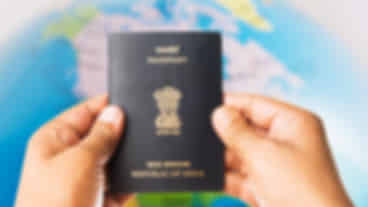Travel Trends 2025: Know it All Before You Plan Your Trip

Travel has evolved from just a hobby to a full-blown lifestyle trend. As we step into 2025, the travel scene is shaping up to be more exciting than ever. With international travel packages on the rise, especially among Indian travelers, exploring the world has never been easier. What’s even better? Many countries are now offering visa-free entry for Indian passport holders, making international travel more accessible than ever. The travel industry has truly upped its game, removing hurdles and adding convenience. Dive into this blog to uncover the top travel trends of 2025 that promise to revolutionize your adventures!
Top Travel Trends in 2025!

1. Sustainable Travel: A New Era for Eco-conscious Wanderers
Sustainability is more than a mere buzzword now; it has become more of a lifestyle for the modern traveler. According to tourists, sustainability is sourcing eco-friendly accommodations, carbon-neutral flights, and destinations opting for responsible tourism. Whether it’s the Maldives tour package that promises eco-tourism benefits or the Bali tours that promote conservation, people are actively searching for greener pastures of travel. Certainly, sustainable travel experiences would be expanding beyond the low-carbon options they have begun to recognize. More and more emphasis will be placed on supporting local communities and wildlife conservation efforts.
2. Remote Work: The Rise of Digital Nomads
2025 will be a year where digital nomads and corporate employees will travel while they work. Most countries around the world are offering these people specialized visas; cities will accommodate this kind of mobile workforce more. That means they can be on a trip across countries like Thailand and Vietnam while still punching their hours in co-working spaces with high-speed internet.
Australia has already announced this initiative. In this growing list of hybrid travel packages, destinations that would provide a few days of balance between leisure and work will automatically be attractive to anyone willing to escape office life, even just for a few weeks.
3. Wellness Travel: The Pursuit of Health and Rejuvenation
In the year 2025, travel will not be about discovering new destinations; it will purely be about discovering one’s own self as far as health and well-being go. Wellness tourism is said to be booming into very fine lines. Mental, physical, and emotional rejuvenation will be factors of consideration. It will include meditation retreats, yoga vacations, and detox programs offered at places like Bali and the Maldives’ tranquil shores. Most wellness seekers in travel will even find a good Dubai package or Thailand package that usually encompasses relaxation, luxury, and fitness experience in some of the most peaceful environments available.
4. Technological Integration: Smart Travel Experiences
Technology continues transforming every aspect of travel, and this is one of the highlighting travel trends in 2025. From AI-powered travel assistants that help plan your trip to virtual reality tours of your destination before booking, travelers will be armed with the most cutting-edge tools. Booking a flight to the places you want to visit, as well as booking hotels and excursions, will be ever so much easier with personalized recommendations and smarter search algorithms. Other innovations will include smart luggage, contactless airport check-ins, and mobile apps to manage everything from planning to in-destination payments as a travel experience becomes standard.
5. Solo Travel: Empowering Personal Journeys
Because the practice of traveling alone has always been accepted, and the trend is, therefore, a solo travel boom, solo travel will continue to rise in the coming years. In 2025, single travelers will increasingly seek safe, friendly, and enriching destinations. Whether it is Bali vacation packages to Vietnam, such locations will afford easy access to group activities and local culture while still allowing for some introspective moments. It is no longer a matter of simply breaking free from the routine of daily life; solo travel now emphasizes self-exploration and rejuvenation as well as deep connections with other human beings.
6. Multi-Generational Travel: Creating Lasting Memories Across Generations
A growing number of families are looking for places that cater to all age groups, from the youngest toddler to the grandparents. Still popular will be European trips such as those in Switzerland and Italy. There will be curative varieties of experiences, as there are dedicated family packages, suiting all types of age groups. Custom itineraries for Dubai ensure that from the youngest to the oldest traveler, memories will be doled out in store.
7. Adventure Travel: Thrills and Experiences Await
Travel, for many, is adventure and challenge. In 2025, adventure tourism increases, where most of the adventurous tourists preference will be trekking, wildlife safaris, diving, and mountaineering expeditions within the visiting year. Be it to book a Vietnam tour package to enjoy picturesque wilds or make a Dubai package adventure safari visit, adventure travel brings out the raw beauty of nature. Sustainability is going to be a big factor in adventure travel, whereby eco-minded practices come in essential to protect natural habitats and wildlife.
8. Off-the-Beaten-Path Destinations: Seeking Authenticity
As traditional tourist spots become overpopulated with tourists, people are increasingly turning to lesser-known travel destinations that promise unique experiences. New Zealand will be one of the countries to receive international fame, along with a part of Eastern Europe, by 2025, because visitors will regard these parts of the world as New Realms in terms of untouched landscapes, rich cultures, and real experiences. The result will be more intimate and personalized trips to places where it’s possible that one can go outside the commercial tourism line and see a more local way of life. These hidden gems will be snapped up by all those searching for authenticity and quieter retreats.
9. Luxury Travel: Tailored, Exclusive Experiences
Luxury travel will continue to evolve by 2025, and yearly it will have more progression in terms of personal and exclusive travel experiences. A high-end private villa in the Maldives, such as a luxury yacht cruise around the Mediterranean, are possible options. Travelers are seeking high-class choices that guarantee privacy, comfort, and unique experiences. Luxury packages will include customized itineraries, private tours, and top-line service. It also caters to the more specific needs and requirements by which travelers draw into making use of them.
10. Visa-Free Travel: Simplifying the Process
Then, for 2025, the changes within the travel process are going to be monumental regarding visas. With many countries relaxing their visa policies and making it easier to travel to their countries freely or with visas on arrival, it will become simpler. International travel is fast becoming simpler than ever. This is sure to be a boon to Indian travelers: they will now find it a breeze to visit Thailand, Dubai, and some parts of Europe, sans any hassle with complex visa forms.
Whether you’re seeking a quiet retreat, an adventurous expedition, or a cultural immersion, there is something for everyone in 2025. So, as you plan your next getaway, make sure to consider these exciting travel trends in 2025 that will redefine the way you experience the world.
Recommended articles for you
Discover Packages


Need help in planning?
Talk to our Travel Experts






























